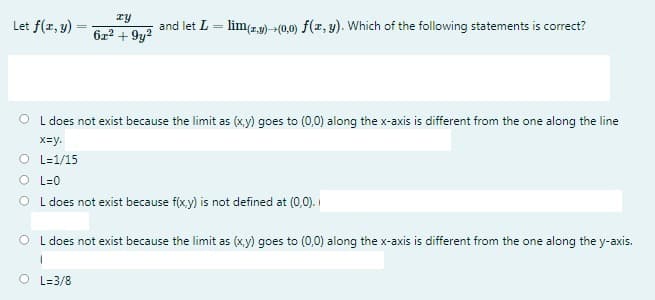zy 6z2 + 9y? and let L = lim(z,y)-(0,0) f(z, y). Which of the following statements is correct? Let f(z, y) O L does not exist because the limit as (xy) goes to (0,0) along the x-axis is different from the one along the line x=y. O L-1/15 O L=0 O L does not exist because fíxy) is not defined at (0,0). O L does not exist because the limit as (xy) goes to (0,0) along the x-axis is different from the one along the y-axis. O L=3/8
zy 6z2 + 9y? and let L = lim(z,y)-(0,0) f(z, y). Which of the following statements is correct? Let f(z, y) O L does not exist because the limit as (xy) goes to (0,0) along the x-axis is different from the one along the line x=y. O L-1/15 O L=0 O L does not exist because fíxy) is not defined at (0,0). O L does not exist because the limit as (xy) goes to (0,0) along the x-axis is different from the one along the y-axis. O L=3/8
Calculus: Early Transcendentals
8th Edition
ISBN:9781285741550
Author:James Stewart
Publisher:James Stewart
Chapter1: Functions And Models
Section: Chapter Questions
Problem 1RCC: (a) What is a function? What are its domain and range? (b) What is the graph of a function? (c) How...
Related questions
Question

Transcribed Image Text:ry
Let f(r, y)
and let L = lim(z.9)>(0,0) f(z, y). Which of the following statements is correct?
%3D
6z2 + 9y?
O L does not exist because the limit as (x.y) goes to (0,0) along the x-axis is different from the one along the line
x=y.
O L-1/15
O L=0
O L does not exist because f(xy) is not defined at (0,0).
O L does not exist because the limit as (x,y) goes to (0,0) along the x-axis is different from the one along the y-axis.
O L=3/8
Expert Solution
This question has been solved!
Explore an expertly crafted, step-by-step solution for a thorough understanding of key concepts.
Step by step
Solved in 2 steps with 1 images

Knowledge Booster
Learn more about
Need a deep-dive on the concept behind this application? Look no further. Learn more about this topic, calculus and related others by exploring similar questions and additional content below.Recommended textbooks for you

Calculus: Early Transcendentals
Calculus
ISBN:
9781285741550
Author:
James Stewart
Publisher:
Cengage Learning

Thomas' Calculus (14th Edition)
Calculus
ISBN:
9780134438986
Author:
Joel R. Hass, Christopher E. Heil, Maurice D. Weir
Publisher:
PEARSON

Calculus: Early Transcendentals (3rd Edition)
Calculus
ISBN:
9780134763644
Author:
William L. Briggs, Lyle Cochran, Bernard Gillett, Eric Schulz
Publisher:
PEARSON

Calculus: Early Transcendentals
Calculus
ISBN:
9781285741550
Author:
James Stewart
Publisher:
Cengage Learning

Thomas' Calculus (14th Edition)
Calculus
ISBN:
9780134438986
Author:
Joel R. Hass, Christopher E. Heil, Maurice D. Weir
Publisher:
PEARSON

Calculus: Early Transcendentals (3rd Edition)
Calculus
ISBN:
9780134763644
Author:
William L. Briggs, Lyle Cochran, Bernard Gillett, Eric Schulz
Publisher:
PEARSON

Calculus: Early Transcendentals
Calculus
ISBN:
9781319050740
Author:
Jon Rogawski, Colin Adams, Robert Franzosa
Publisher:
W. H. Freeman


Calculus: Early Transcendental Functions
Calculus
ISBN:
9781337552516
Author:
Ron Larson, Bruce H. Edwards
Publisher:
Cengage Learning